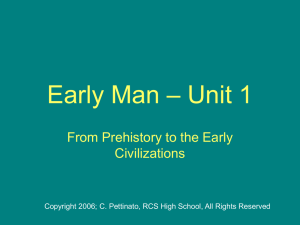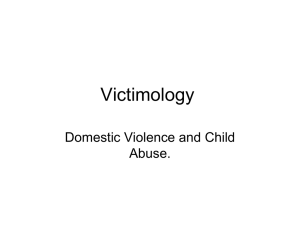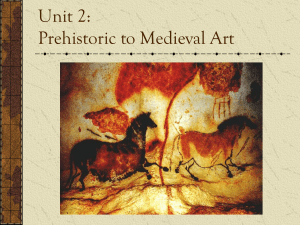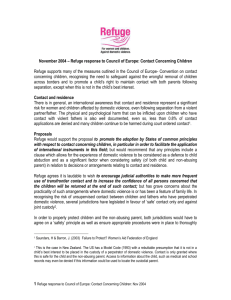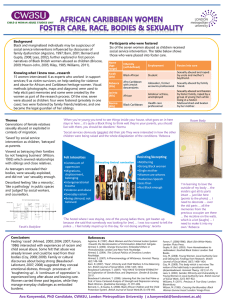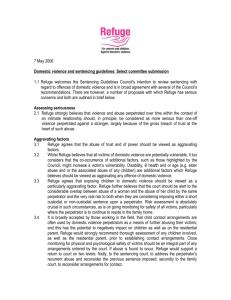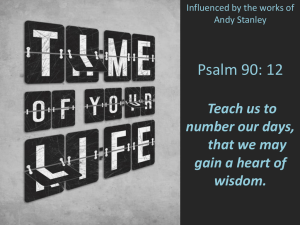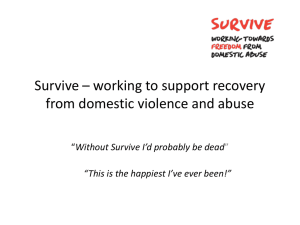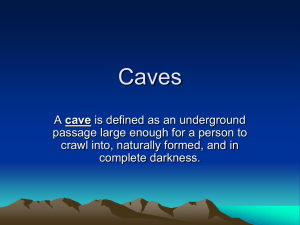Powerpoint - Women`s Ministries
advertisement
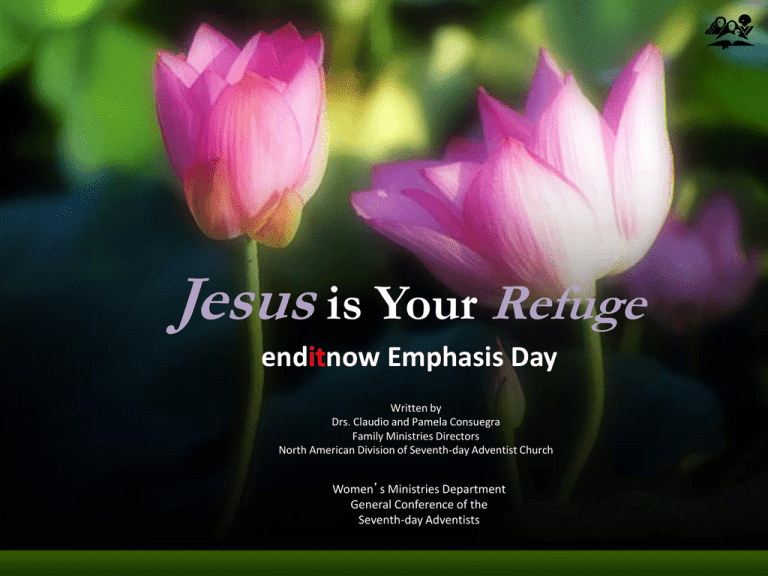
Jesus is Your Refuge enditnow Emphasis Day Written by Drs. Claudio and Pamela Consuegra Family Ministries Directors North American Division of Seventh-day Adventist Church Women’s Ministries Department General Conference of the Seventh-day Adventists • The Jewish people have held an ideal standard for Jewish family life that is manifested in the term shalom bayit. Shalom bayit signifies completeness, wholeness, and fulfillment. • For example, the Jewish betrothal ceremony is referred to in classical rabbinic literature as Kiddushin which means hallowing, sanctification, consecration. • All of this would lead to Shalom Bayit! A peaceful, wholesome, kind home. A home where there is Shalom Bayit will be a home where domestic violence should not exist. Domestic violence is an oxymoron, a contradiction in terms, a denial of God’s plan for our lives and our marriages What Exactly Is Domestic Violence? • Domestic violence, spouse abuse, battering, family violence, and domestic disputes all describe the mistreatment of a one person by another with whom he or she lives or has lived Misuse of Religion Can Be Harmful • Often there is a religious component to dealing with abuse, and that is while acknowledging domestic abuse, the sanctity of marriage is put above one’s personal safety. Societal and Cultural Views Can Also Be Harmful • Domestic violence is always wrong! It is a crime! It is a sin! It needs to stop! Children Are Affected by Domestic Violence • Approximately 50 - 75% of batterers who abuse their spouse, also beat their children. • There is the report of a man who kicked his pregnant wife in the stomach trying to cause her to abort their child. • Another man suffered a broken arm as a young child because his mother wanted a girl instead of a boy. So Why Do Women Stay? • We need to understand: there are many home, society, church, and financial realities. In particular women experiencing domestic violence experience powerlessness, hurt, guilt, shame, isolation, impaired trust, depression, helplessness, anger, humiliation, embarrassment, degradation, low selfesteem, and fear. Good News Psalm 142 (A maskil of David when he was in the cave) 1 To the Lord I cry out; to the Lord I plead for mercy. 2 I pour out my lament before him; I tell him about my troubles. 3 Even when my strength leaves me, you watch my footsteps. In the path where I walk they have hidden a snare for me.4 Look to the right and see! No one cares about me. I have nowhere to run; no one is concerned about my life. 5 I cry out to you, O Lord; I say, "You are my shelter, my security in the land of the living.” 6 Listen to my cry for help, for I am in serious trouble! Rescue me from those who chase me, for they are stronger than I am. 7 Free me from prison, that I may give thanks to your name. Because of me the godly will assemble, for you will vindicate me. In this psalm, King David, gives us six (6) steps to dealing with abuse. 1. Resolve to leave your abuser. • The introductory words of the psalm tells us that it is a maskil of David when he was in the cave. A maskil is a contemplative poem, a prayer set in the form of a poem. • God knows you, He sees you! He understands the “cave” you are in! He has not forgotten you! 2. Admit your pain and need to God. • The darkness of the cave is an analogy for the darkness abused victims feel while in their horrible, painful situation. It is like a black hole from which they can’t see a way out. • While in your cave, cry out to Him. Admit the abuse. Tell Him of your pain. Tell Him of your troubles. Tell Him you feel helpless and maybe even hopeless. 3. Figure out your limits. • David must have felt physically and emotionally exhausted. He writes that his “strength” left him. • If you are abused, you know what that is like. It doesn’t matter whether you say or do something or if you don’t do or say anything, your abuser will be angry and find a reason to hurt you. 4. Affirm your confidence in God. David continues his prayer in verse 5: I cry out to you, O Lord;/ I say, “You are my shelter,my security in the land of the living.” The marvelous thing about David’s prayer, at this point, is that he knows his situation is NOT hopeless. In the deepest, darkest time of his life— his personal cave— he still knew God was his shelter, his security. 5. Get a hold of God’s help. • We can identify with David’s plea, particularly if we are the ones being persecuted and abused. It is when we are under those circumstances, when we feel helpless and our foes are much stronger than we are, we can cry out to Him, because God knows a way out from our situation. 6. Expect God to fulfill His Promise. • If you are being abused, remember, “God is your refuge!” It may seem as if your situation is hopeless, the walls of your cave seem to be closing in. Please remember, “God is our refuge and strength, a very present help in trouble.” Psalm 46:1, KJV • You may choose to continue living in that cave, hiding from your enemy, fleeing from your troubles even though trouble follows you, but it is not a healthy place to live. God will help you to find a way out safely just as He did for David. “In God is my salvation and my glory; The rock of my strength, And my refuge, is in God. Trust in Him at all times, you people; Pour out your heart before Him; God is a refuge for us” Psalm 62:7-8, NKJV Jesus wants to be your refuge. He wants to provide for you, surround you with His arms so your home can become a shelter, a place of safety. May our churches become shelters for those who live in the cave of domestic abuse.

